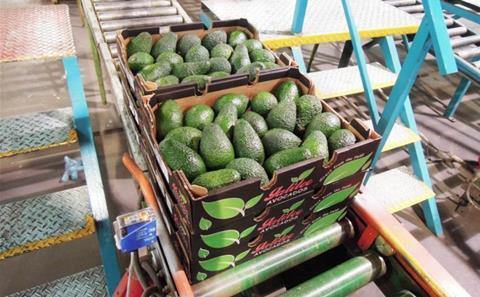
Israeli avocado exporters could potentially benefit from an anticipated drop in Chilean production this season, according to one of the country’s leading marketers.
And as demand for the Hass variety in particular continues to rise, Galilee Export has signed a new agreement with a packhouse called Zemach, putting it in a position to increase its exports from 17,000 tonnes to 23,000 tonnes this year.
“With considerably less product from Chile this season, we expect the price for our product to be good,” says the company’s vice-president of marketing, Eitan Zvi.
Convinced that ready-to-eat is the future as far as avocados are concerned, Galil Export is also investing in ripening rooms in France to help guarantee 12-month supply.
The new facility will be located in the southern part of France, from where Israeli avocado shipments can be ripened and then efficiently distributed throughout Europe.
Confidence spreading
Israel’s other major avocado supplier, significantly ahead of third-placed Kedem Hadarim in terms of volume, is Mehadrin.
The group’s export manager Ronen Eisenberg says he is “optimistic” about the future of the category in Israel.
Real proof of that confidence, he suggests, can be found in the overall rate of new plantings being undertaken in the country – these are currently running at around 300ha per year, with more than two-thirds of them Hass.
According to Eisenberg, Israel could realistically be producing 130,000 tonnnes of avocados by 2020. He also feels that the local market has the capacity to significantly expand.
Growth plan
Miki Noy, head of the Israeli Ministry of Agriculture’s extension service for sub-tropical crops, confirms that total avocado production in the country is currently estimated at between 90,000 and 100,000 tonnes, from a combined surface area of 7,000ha.
Around 35-40 per cent is Hass and 60-65 per cent green, with about 55 per cent of the total volume is exported, leaving 45 per cent for local consumption.
Production is concentrated on the coastal plain, all the way from Ashdod in the south up to the Lebanese border, representing about 70 per cent of total production.
The other key area is the Upper Jordan Valley, from south of the Sea of Galilee northwards.
In addition to 12-15 small and medium packhouses, the two major stations are Milopri (in the north, near Acco) and Granot (in the centre, near Hadera).
These two pack close to 70 per cent of Israel’s total avocado production.
Milopri ships its product via Galilee Export, an export company that belongs to Milopri growers, while Mehadrin sources its fruit primarily from Granot.
This article was corrected after publication as it originally implied that Mehadrin was single-handedly accounting for Israel's 300ha of new avocado plantings per annum and would produce 130,000 tonnes per year by 2020.



